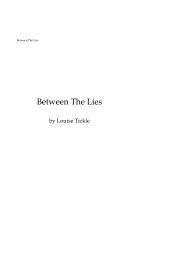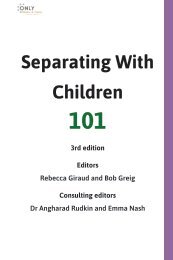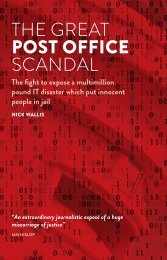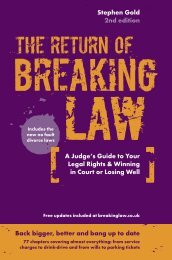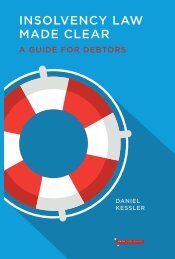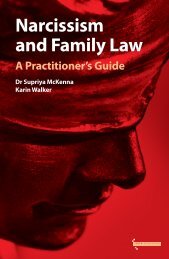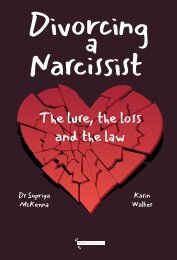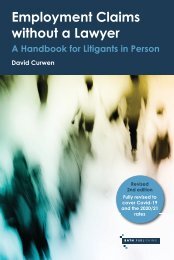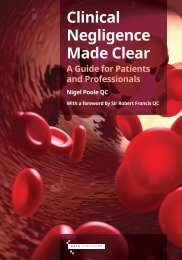The 'Secret' Family Court: Fact Or Fiction?
For approaching two decades, family courts have been accused of making life changing decisions about children and who they live with made in secret, away from the scrutiny of the public gaze. Recognising the force of these accusations, senior family courts judges have, over that time, implemented a raft of rule changes, pilot projects and judicial guidance aimed at making the family justice more accountable and transparent. But has any progress been made? Are there still suspicions that family judges make irrevocable, unaccountable decisions in private hearings? And if so, are those suspicions justified and what can be done to dispel them? In this important and timely new book, Clifford Bellamy, a recently retired family judge who has been at the sharp end of family justice during all these changes, attempts to answer those questions and more. He has spoken to leading journalists, judges and academic researchers to find out what the obstacles to open reporting are – be they legal, economic or cultural - and interweaves their insights with informed analysis on how the laws regulating family court reporting operate. Along the way he provides a comprehensive review of the raft of initiatives he has seen come and go, summarises the position now and uses this experience to suggest how this fundamental aspect of our justice system could adapt in the face of this criticism. Every professional working in the family justice system – lawyers, social workers, court staff and judges - as well as those who job it is to report on legal affairs, should read this informative, nuanced exposition of what open justice means and why it matters so much to those whose lives are upended by the family justice system.
For approaching two decades, family courts have been accused of making life changing decisions about children and who they live with made in secret, away from the scrutiny of the public gaze. Recognising the force of these accusations, senior family courts judges have, over that time, implemented a raft of rule changes, pilot projects and judicial guidance aimed at making the family justice more accountable and transparent.
But has any progress been made? Are there still suspicions that family judges make irrevocable, unaccountable decisions in private hearings? And if so, are those suspicions justified and what can be done to dispel them?
In this important and timely new book, Clifford Bellamy, a recently retired family judge who has been at the sharp end of family justice during all these changes, attempts to answer those questions and more. He has spoken to leading journalists, judges and academic researchers to find out what the obstacles to open reporting are – be they legal, economic or cultural - and interweaves their insights with informed analysis on how the laws regulating family court reporting operate. Along the way he provides a comprehensive review of the raft of initiatives he has seen come and go, summarises the position now and uses this experience to suggest how this fundamental aspect of our justice system could adapt in the face of this criticism.
Every professional working in the family justice system – lawyers, social workers, court staff and judges - as well as those who job it is to report on legal affairs, should read this informative, nuanced exposition of what open justice means and why it matters so much to those whose lives are upended by the family justice system.
Create successful ePaper yourself
Turn your PDF publications into a flip-book with our unique Google optimized e-Paper software.
<strong>The</strong> ‘Secret’ <strong>Family</strong> <strong>Court</strong> – <strong>Fact</strong> <strong>Or</strong> <strong>Fiction</strong>?<br />
Law Faculty at the University of Auckland, New Zealand), Professor Rollie<br />
Thompson (Professor of Law, Schulich School of Law, Dalhousie University,<br />
Halifax, Nova Scotia), Professor Nicholas Bala (Professor of Law at<br />
the Faculty of Law, Queen’s University, Kingston, Ontario) and Dr Gillian<br />
Black (Senior Lecturer in <strong>Family</strong> Law at the University of Edinburgh) for<br />
the help they have given me to enable me to understand something about<br />
the role of transparency in the family courts of those other countries. I am<br />
also grateful for the help I have received from Virginia Wilson (Deputy<br />
Principal Registrar and National <strong>Family</strong> Law Registrar in the <strong>Family</strong> <strong>Court</strong><br />
of Australia in Canberra), Glenda Frew (Judgments Publication Manager)<br />
and Katie Boyd (Judgments Co-ordinator in the Federal <strong>Court</strong> of Australia).<br />
With the President’s permission, and with the help of Louise Tickle, I have<br />
interviewed ten journalists including Louise herself. I am grateful to Sanchia<br />
Berg 3 (Reporter, the Today programme, BBC News), John Sweeney 4 (Freelance<br />
writer and broadcaster), Mike Dodd 5 (Legal editor, PA Media), Mark<br />
Hanna 6 (Senior University Teacher in the Department of Journalism Studies<br />
at the University of Sheffield), Brian Farmer (Journalist, PA Media),<br />
Josh White (Journalist, the Daily Mail), Polly Curtis 7 (Tortoise Media),<br />
Emily Dugan 8 (BuzzFeed News) and Claire Hayhurst (Regional reporter,<br />
PA Media) for giving me their time and the benefit of their experience and<br />
insights.<br />
As I completed each chapter my two sons, Christopher and Jonathan, cast<br />
an eye over it, pointing out errors and making suggestions for improvement.<br />
<strong>The</strong> book is the better for their suggestions and constructive criticism. I am<br />
very grateful to them both. I am also grateful to Her Honour Judge Sally<br />
3<br />
In 2011, the Bar Council gave special praise for Sanchia Berg’s piece about the <strong>Family</strong><br />
<strong>Court</strong>, Legal Aid and Domestic Abuse reform. In 2015 she won the Bar Council Legal<br />
Reporting award for two pieces of work relating to the <strong>Court</strong> of Protection and the <strong>Family</strong><br />
<strong>Court</strong>. In 2016, she was long-listed for the <strong>Or</strong>well Prize, “Exposing Britain’s Social Evils”.<br />
4<br />
In 2005, John Sweeney won the Royal Television Society and the Paul Foot awards for his<br />
investigation into miscarriages of justice relating to cases of shaken baby syndrome.<br />
5<br />
Mike Dodd is a co-editor of the leading text book McNae’s Essential Law for Journalists. He is<br />
also a member of the Law Board of the National Council for the Training of Journalists.<br />
6<br />
Mark Hanna is a co-editor of McNae’s Essential Law for Journalists. He is also Chair of the<br />
National Council for Training of Journalists Media Law Examination Board.<br />
7<br />
Polly Curtis’ project on family separation was nominated for a British Press Awards special<br />
journalist award 2019. <strong>The</strong> full project can be found at: https://www.tortoisemedia.com/casefiles/separated.<br />
8<br />
Emily Dugan was the winner of the 2018 Bar Council Legal Reporting Award for her<br />
access to justice campaign exposing failings in the UK’s legal system and the 2019 Private<br />
Eye Paul Foot Award. In 2019 she was short-listed for the News Reporter of the Year at the<br />
National Press Awards.<br />
viii



